Author: Lucio Chachamovich

-
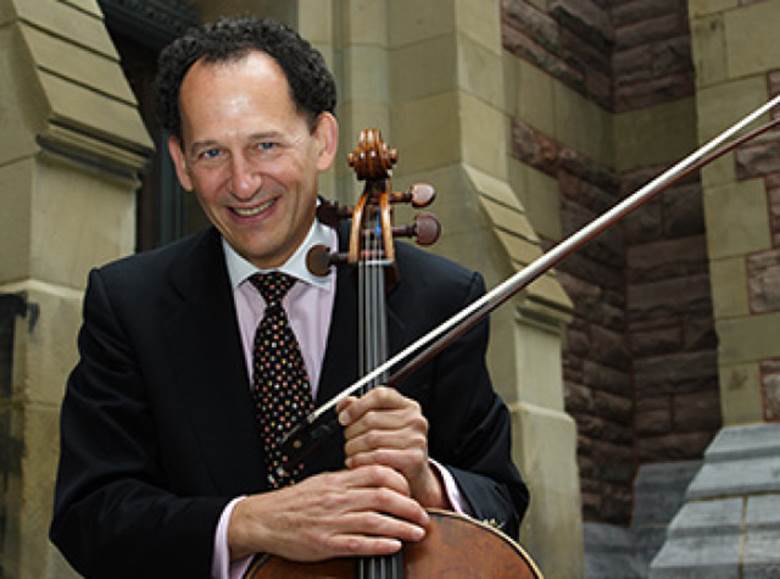 Denis Brott, 2015.Photo Credit : Canadian Jewish News
Denis Brott, 2015.Photo Credit : Canadian Jewish News -
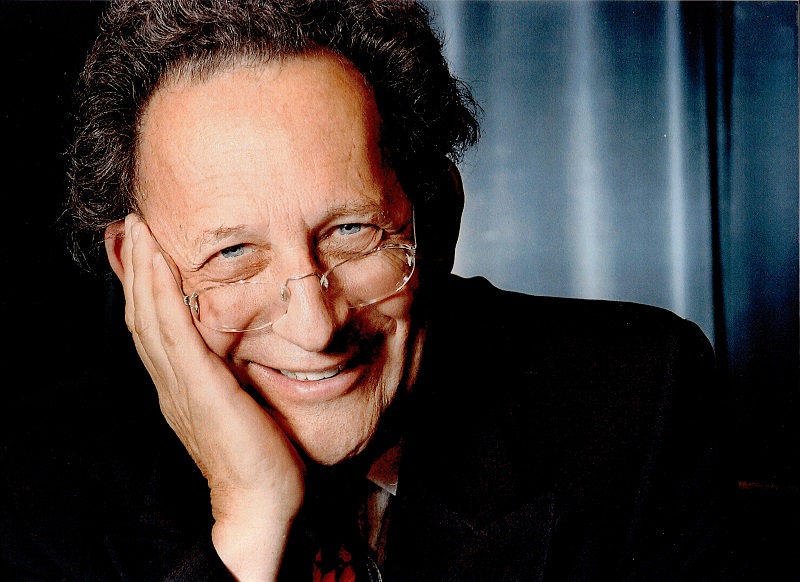 Boris Brott.Photo Credit : Brott Music Festival
Boris Brott.Photo Credit : Brott Music Festival -
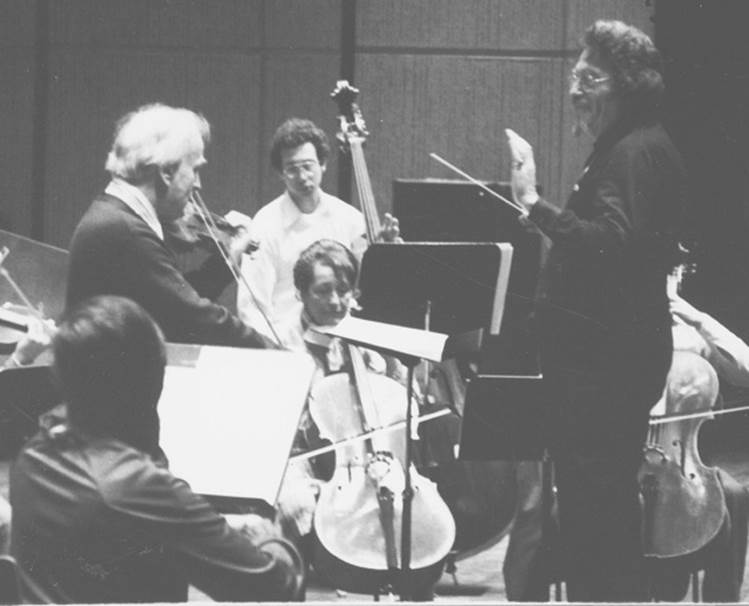 Alexander Brott Conducting a group of musicians.Photo Credit : Alexanderbrott.ca
Alexander Brott Conducting a group of musicians.Photo Credit : Alexanderbrott.ca -
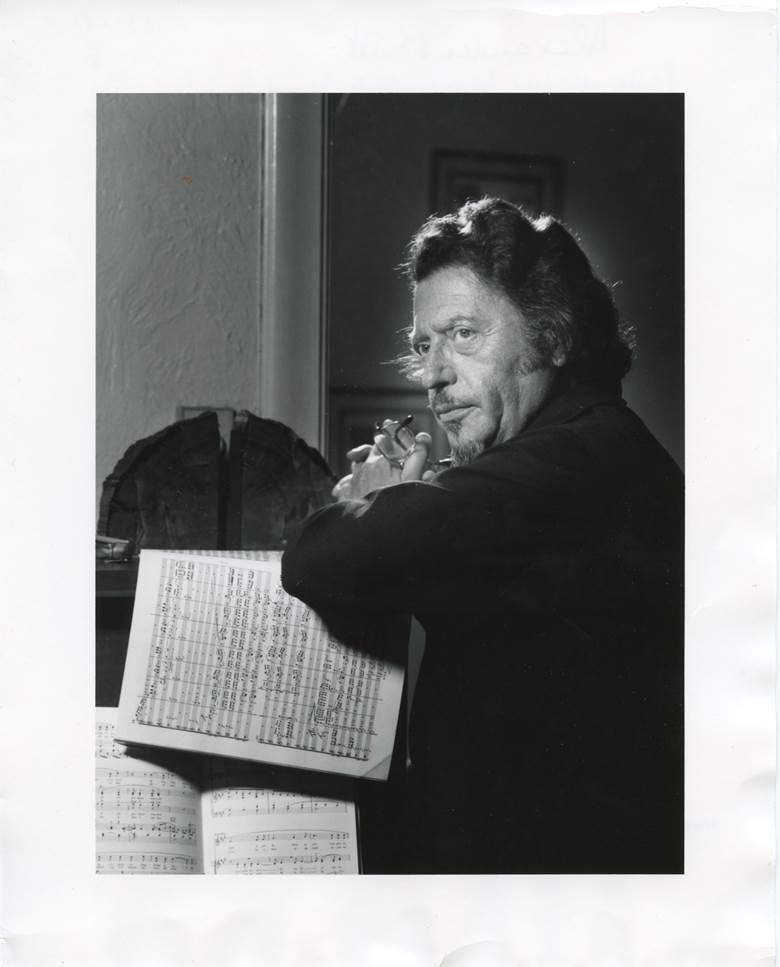 Alexander Brott in the 1960s.Photo Credit : V. Tony Hauser and the Jewish Public Library - Archives
Alexander Brott in the 1960s.Photo Credit : V. Tony Hauser and the Jewish Public Library - Archives
The Brott Family
Comprised of Alexander (father), Lotte (mother), Denis (son) and Boris (son), the Brott family has had a profound impact on the development and history of classical music in Canada.
Acclaimed cellist Lotte was born in Mannheim, Germany in 1922. She graduated from Switzerland’s Zurich Conservatory in 1939, and moved to Canada that same year, where she studied at the University of Toronto. In Canada, she performed with the MSO, the McGill Chamber Orchestra, and the Little Symphony of Montreal, and taught cello at McGill. Her love of music not only manifested itself through performing and teaching, but through her dedication to organizing various musical events and programs. She organized concerts, did fundraising and PR for McGill and organizations where her husband, Alexander, was the artistic director; she also managed the Kingston Symphony from 1978-81. Lotte was named a Member of the Order of Canada (1990) and a Knight of the Order of Quebec (1996). The McGill Chamber Orchestra set up the Lotte Brott Memorial Fund in her honour, to encourage young musicians.
Born in Montreal to Ashkenazi Jewish parents, Alexander Brott was a composer, conductor, violinist and music teacher. He earned degrees from McGill and Juilliard before beginning his career as a concert violinist in the 1930s. He quickly made a name for himself with his elegant style and technical precision. In 1939, he joined the faculty at McGill, where he founded and pioneered the McGill Chamber Orchestra. He taught there until his retirement in 1980. From 1945-58, he simultaneously lead the Montreal Orchestra, Les Concerts symphoniques de Montréal and the Montreal Symphony Orchestra. He was made a Member of the Order of Canada (1979) and a Knight of the National Order of Quebec (1988).
As a couple, Alexander and Lotte co-founded the Concerts Under the Stars series at Mount Royal, and concerts at Maurice Richard Arena.
Their son Boris (b. 1944) is a conductor and founding director of the New West Symphony Orchestra, and their son Denis (b. 1950) is a cellist, music teacher and the founder of the Montreal Chamber Music Festival. Boris has conducted on stages around the world, including Carnegie Hall and Covent Garden, with his trademark innovative, energetic style. He is also known for promoting Canadian musical talent, and commissioning, performing and recording Canadian music. Denis has performed cello throughout the world; he played with the Orford String Quartet for eight years. He recorded a discography of chamber music, including the Grand Prix du Disque Award-winning complete string quartets of Beethoven and the Best Chamber Ensemble Classical Recording, which received two Juno Awards.
Learn more:
http://brottmusic.com/maestro-boris-brott/
http://www.thecanadianencyclopedia.com/en/article/alexander-brott-emc/
http://borisbrott.com/default.html
http://nationalacademyorchestra.com/
http://greatmontrealers.ccmm.qc.ca/en/30/

-
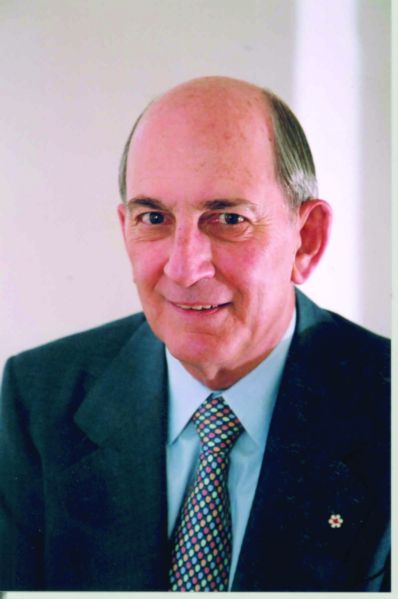
-
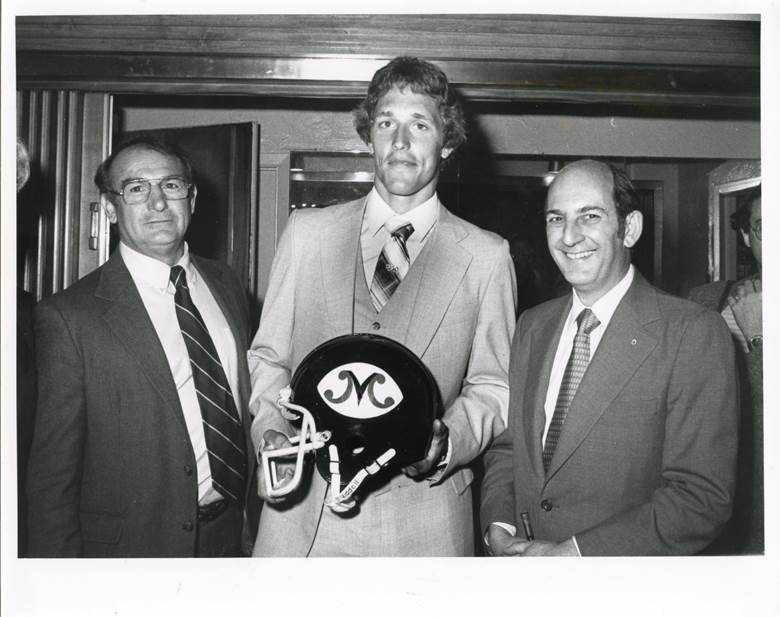 Charles Bronfman with Les Concordes quarterback Luc Tousignant, displaying helmet with team's logo, and Concordes president Sam Etcheverry, 1982.Photo Credit : Jewish Public Library - Archives
Charles Bronfman with Les Concordes quarterback Luc Tousignant, displaying helmet with team's logo, and Concordes president Sam Etcheverry, 1982.Photo Credit : Jewish Public Library - Archives -
 Charles Bronfman co-founded Taglit Birthright Israel, which has sent over 500,000 young Jews on a free trip to Israel.Photo Credit : Sivan Farag
Charles Bronfman co-founded Taglit Birthright Israel, which has sent over 500,000 young Jews on a free trip to Israel.Photo Credit : Sivan Farag -
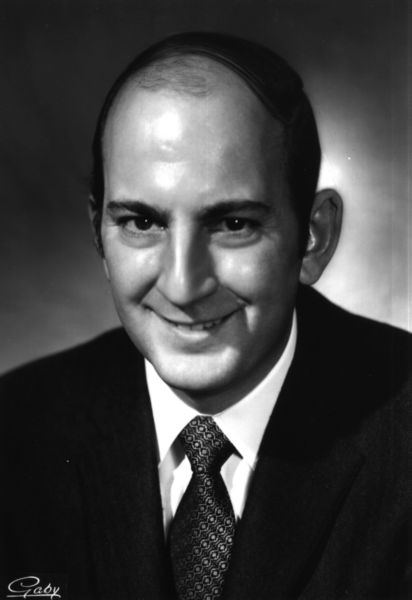 Charles Bronfman.Photo Credit : Alex Dworkin Canadian Jewish Archives
Charles Bronfman.Photo Credit : Alex Dworkin Canadian Jewish Archives -
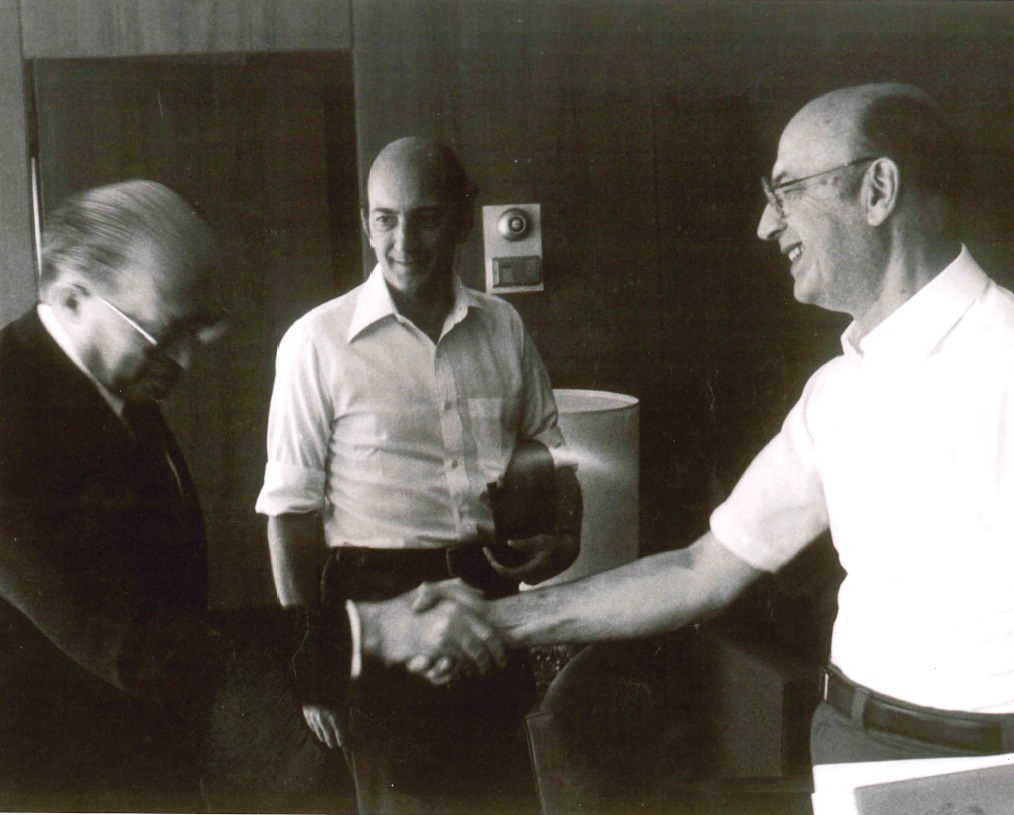 Charles Bronfman and Manny Batshaw.Photo Credit : Jewish Public Library - Archives
Charles Bronfman and Manny Batshaw.Photo Credit : Jewish Public Library - Archives
Charles Bronfman
Charles Bronfman is a Canadian philanthropist and Jewish community leader, and the original owner of the Montreal Expos.
Bronfman was born in Montreal – where he would spend the majority of his life – to parents Samuel and Saidye Bronfman . After graduating from McGill University, he became closely involved with his father’s liquor business, Seagram’s. For close to 50 years, he worked for the company in various positions, including President and Co-Chairman. Bronfman has also been involved with Cemp Investments, the predecessor of his investment firm, Claridge, which was founded in 1987.
In 1968, the Montreal Expos was formed – the first Canadian team admitted to the National Baseball League. Bronfman became their first majority owner. Then, in 1982, one day after the Montreal Alouettes fell under financial collapse, Bronfman bought their remains and began the Montreal Concordes.
Like his parents, Bronfman is deeply committed to philanthropic ventures. Amongst many other initiatives in Canada, the United States and Israel, in 1999, he founded Taglit Birthright, which provides free, educational trips to Israel for young Jewish adults. He continues to remain one of the program’s principal donors. He is also the Chairman of the Andrea and Charles Bronfman Philanthropies Inc., a collection of international charitable organizations. Furthermore, he has become a leader in the Jewish community, occupying positions including first Chairman of the United Jewish Communities (now the Jewish Federations of North America).
Canada’s Heritage Minutes also has links to Bronfman: He was a founding Co-Chairman of Historica, which produced the popular television shorts. Indeed, it was his comment during a meeting – “if television can use 30 seconds or 60 seconds to persuade people that Cadillacs or cornflakes are interesting, couldn’t we also use that short piece of time to persuade Canadians that their history is interesting? You tell me how to do it and I’ll fund it.” – that led to their conception.
Bronfman has been awarded numerous honours and accolades, including Officer of the Order of Canada (1981), Companion to the Order of Canada (1992) and Member of the Quebec’s Privy Council (1992). In 2012, he joined Warren Buffett and Bill Gates’ Giving Pledge, promising to give away the majority of his fortune.
Charles is married to Rita Bronfman, has two children, Stephen and Ellen Bronfman, and six grandchildren. His son Stephen is the Executive Chairman of Charles’ investment firm, Claridge Inc., and sits on multiple Boards of Directors, including the David Suzuki Foundation. Furthermore, he is the Revenue Chair of the Liberal Party of Canada. With his wife, Stephen founded the Claudine and Stephen Bronfman Family Foundation, carrying on the philanthropic tradition of his parents and grandparents.
Learn more:
https://en.wikipedia.org/wiki/Charles_Bronfman
http://www.thecanadianencyclopedia.ca/en/article/charles-bronfman/

-
 Adam Braz, 2008Photo Credit : Longbomb, Public Domain.
Adam Braz, 2008Photo Credit : Longbomb, Public Domain.
Adam Braz
Adam Braz is an accomplished Canadian soccer player and the current Technical Director of the Montreal Impact.
Braz received his bachelor’s degree from the Fairfield University Dolan School of Business in 2001. From 1999 to 2001, he played college soccer at Fairfield University for the Fairfield Stags men’s soccer team. In 2000, he helped the team earn a national ranking of 15. In 2002, Braz began his nine-year professional soccer career, signing to the Montreal Impact. A tall defender, he played an important role in the Impact defense, helping the team make the playoffs. In 2004, he contributed to the Impact winning the USL First Division Championship.
Braz was one of the first players to sign with MLS expansion franchise Toronto FC during the 2006–07 soccer season. Afterwards, he was transferred back to the Montreal Impact, and helped bring them to the finals, where they faced off against the Vancouver Whitecaps FC; this was the first time in USL history where two Canadian clubs played each other in the final match. The Impact won the series, making it their third USL Championship, and Braz’s second. In 2009, Braz received the team’s Unsung Hero Award.
Braz made his debut for Canada internationally in a January 2004 match against Barbados. In July 2005, he was invited to play for Canada in the Gold Cup. His last international match was in 2007, and he retired from playing soccer in 2011.
Learn more:
https://en.wikipedia.org/wiki/Adam_Braz
http://www.impactmontreal.com/en/club/adam-braz
http://www.lapresse.ca/sports/soccer/201501/23/01-4837779-impact-adam-braz-entre-fierte-et-responsabilites.php
https://www.youtube.com/watch?v=d-tlSZVuiCY
http://www.rds.ca/videos/soccer/impact/impact-salazar-merite-son-contrat-adam-braz-3.1174987
https://www.youtube.com/watch?v=SLfwLChvZCI

-
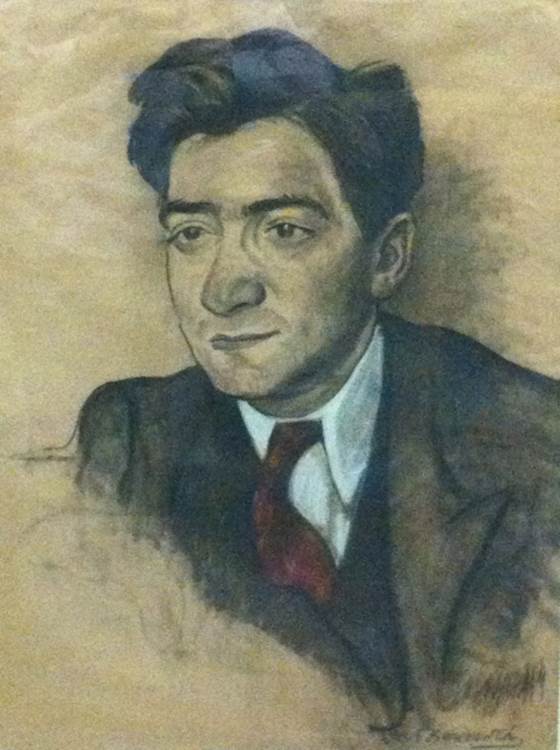 Portrait of poet Shabse Perl drawn by Alexander Bercovitch.Photo Credit : Alex Dworkin Canadian Jewish Archives
Portrait of poet Shabse Perl drawn by Alexander Bercovitch.Photo Credit : Alex Dworkin Canadian Jewish Archives -
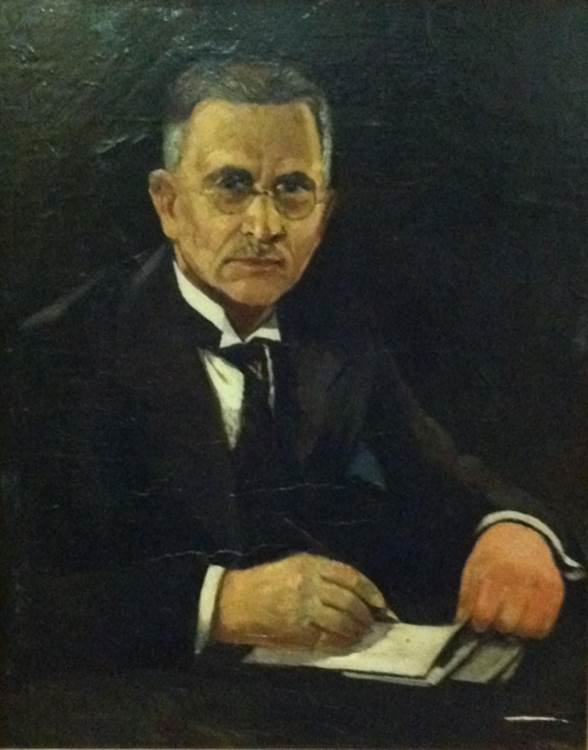 Portrait of A. L. Kaplansky by Alexander Bercovitch. Undated.Photo Credit : Alex Dworkin Canadian Jewish Archives
Portrait of A. L. Kaplansky by Alexander Bercovitch. Undated.Photo Credit : Alex Dworkin Canadian Jewish Archives -
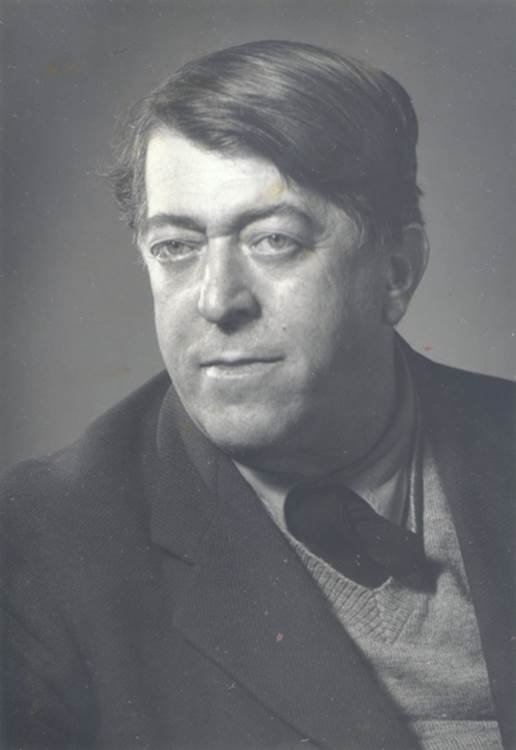 Alexandre Bercovitch, ca. 1940s.Photo Credit : Alex Dworkin Canadian Jewish Archives
Alexandre Bercovitch, ca. 1940s.Photo Credit : Alex Dworkin Canadian Jewish Archives -
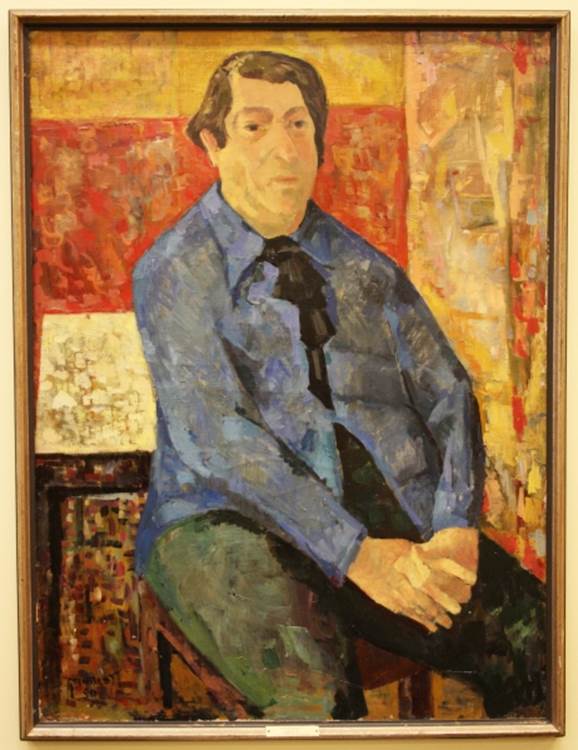 Portrait of Alexandre Berkovitch painted by Moe ReinblattPhoto Credit : Jewish Public Library Art Collection
Portrait of Alexandre Berkovitch painted by Moe ReinblattPhoto Credit : Jewish Public Library Art Collection
Alexander Bercovitch
Alexander Bercovitch was a founding member of the Eastern Group of Painters and arguably the father of modern Jewish painting in Montreal.
Bercovitch was born in a small port city near Odessa, in present-day Ukraine, to a family that was poor even by shtetl standards. After being given his first paints by a community of Ukrainian monks he had been spying on through metal gates for years, he quickly developed a talent for the art form. Indeed, by the time he was 15, he had established a local reputation, and was creating theatre sets and costumes. He spent three years studying at Jerusalem’s Bezalel Art School, and later in Munich and St. Petersburg.
He deserted the Tsarist army shortly after being drafted during the First World War, and went into hiding until the Revolution of 1917. Bercovitch lived for several years in Turkmenistan, continually painting, until he ran afoul of the Communist authorities and relocated with his family to Montreal in 1926.There, Bercovitch and his wife, Bryna Avrutick, who had been a revolutionary back in Russia, maintained their radical politics, naming two of their children Ninel (Lenin spelled backwards) and Sacvan (for the executed Italian anarchists Sacco and Vanzetti) – who would later become a well-known American literary critic. Their first child, Sylvia Ary, became a well-known artist in her own right.
Life in the immigrant Plateau neighbourhood was difficult for the impoverished Bercovitches during the 1920s and 30s. Bercovitch left his family shortly after arriving, rejoining them six months later. When he left them for good in 1942, Sacvan was placed in foster care. Upon first arriving in Montreal, Bercovitch had earned money doing ceiling work for local churches and synagogues. He also occasionally exhibited his own work from his years in Turkmenistan, alongside Montreal-themed canvases.
He joined a roving band of artists called the Eastern Group of Painters, which countered the explicit Canadian nationalism of the more famous Group of Seven and its successor, the Canadian Group of Painters. Bercovitch was a teacher, mentor and harsh critic of the younger generation of Montreal Jewish painters, including Sam Borenstein, Moe Reinblatt and Rita Briansky. He was famous as much for his classic Canadian paintings, like Laurentian Snow Scene (1938) and Gaspe: Cliff and Sea (1940), as he was for more Montreal- and Jewish-centered works such as the classic Laurier (1933), which he painted from his own balcony.
On January 7, 1951, Bercovitch collapsed of a heart attack while waiting for a streetcar at the corner of Mont-Royal and St. Laurent. He was en route to his first exhibition in 10 years.
Special thanks to the Museum of Jewish Montreal.
Learn more:
http://imjm.ca/location/1277
http://mimj.ca/location/1764
http://cybermuse.gallery.ca/cybermuse/enthusiast/thirties/artist_e.jsp?iartistid=438
https://en.wikipedia.org/wiki/Jewish_Painters_of_Montreal

-
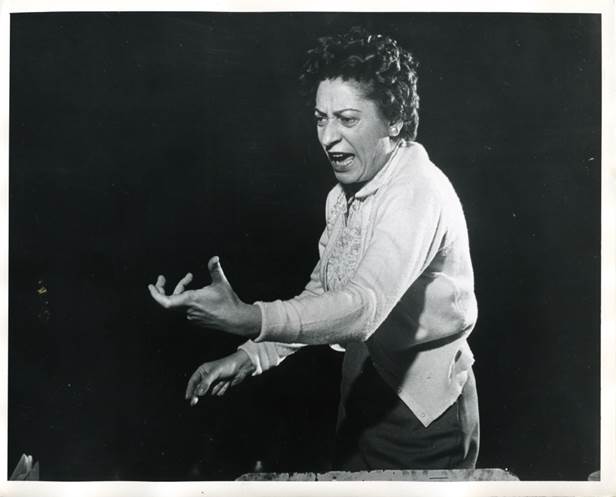 Ethel Stark conducting the Toronto Symphony.Photo Credit : Jewish Public Library - Archives
Ethel Stark conducting the Toronto Symphony.Photo Credit : Jewish Public Library - Archives -
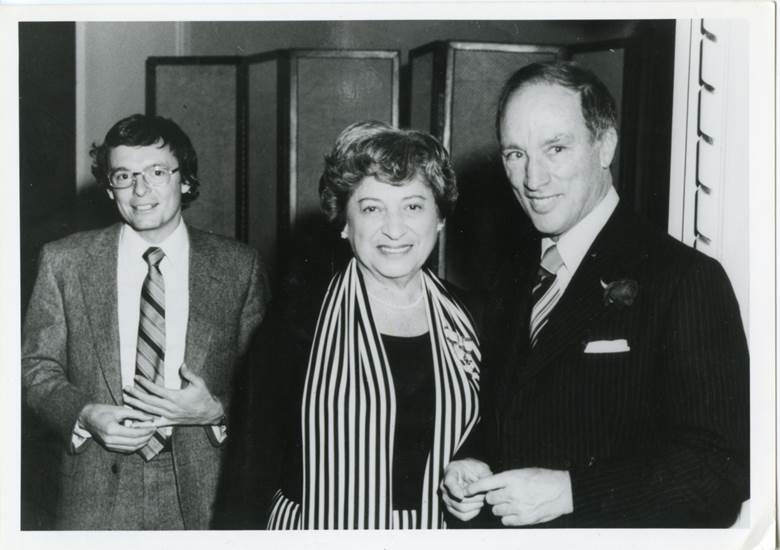 Prime Minister Trudeau receiving Ethel Stark, the first Canadian woman to achieve international recognition as a symphonic conductor, at Government House after her appointment to the Order of Canada.Photo Credit : Jewish Public Library - Archives
Prime Minister Trudeau receiving Ethel Stark, the first Canadian woman to achieve international recognition as a symphonic conductor, at Government House after her appointment to the Order of Canada.Photo Credit : Jewish Public Library - Archives -
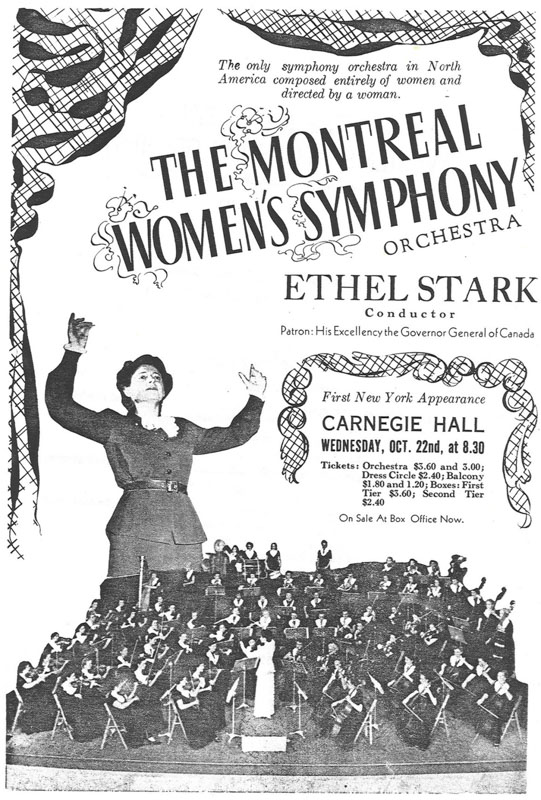 Poster advertising Ethel Stark’s The Montreal Women’s Symphony (1970s).Photo Credit : Jewish Public Library - Archives
Poster advertising Ethel Stark’s The Montreal Women’s Symphony (1970s).Photo Credit : Jewish Public Library - Archives -
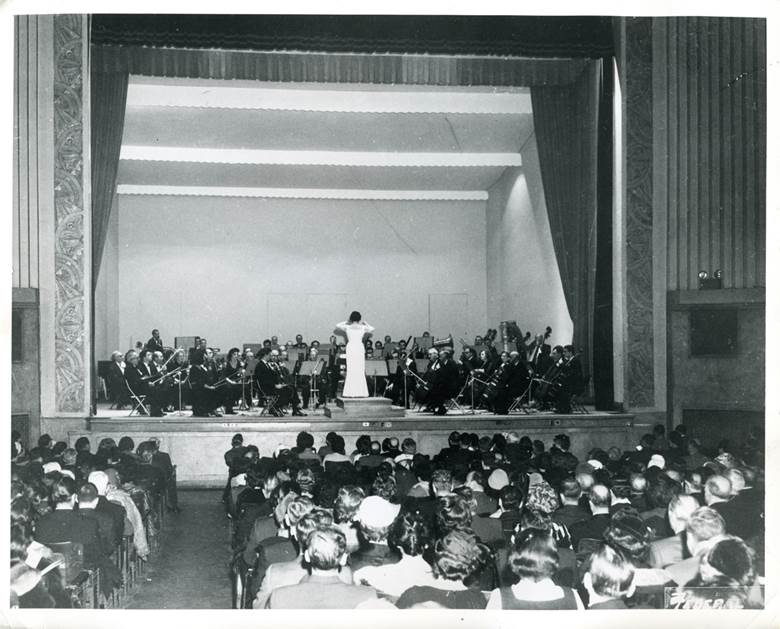 Ethel Stark conducting The Ethel Stark Syphonietta.Photo Credit : Jewish Public Library - Archives
Ethel Stark conducting The Ethel Stark Syphonietta.Photo Credit : Jewish Public Library - Archives -
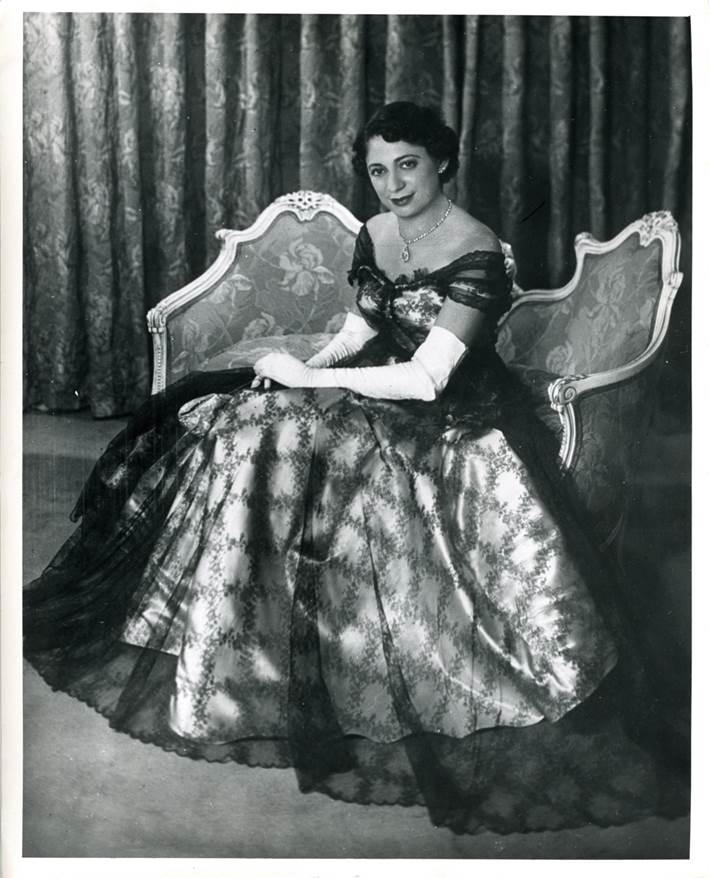 Ethel Stark, taken at the time she was presented to Her Royal Highness Queen Elizabeth II and Prince Philip.Photo Credit : Jewish Public Library - Archives
Ethel Stark, taken at the time she was presented to Her Royal Highness Queen Elizabeth II and Prince Philip.Photo Credit : Jewish Public Library - Archives -
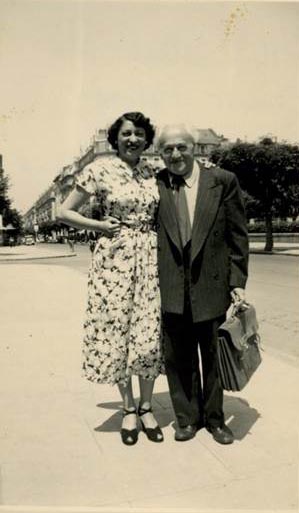 Ethel Stark & Ernest Bloch in Geneva, Switzerland.Photo Credit : Jewish Public Library - Archives
Ethel Stark & Ernest Bloch in Geneva, Switzerland.Photo Credit : Jewish Public Library - Archives -
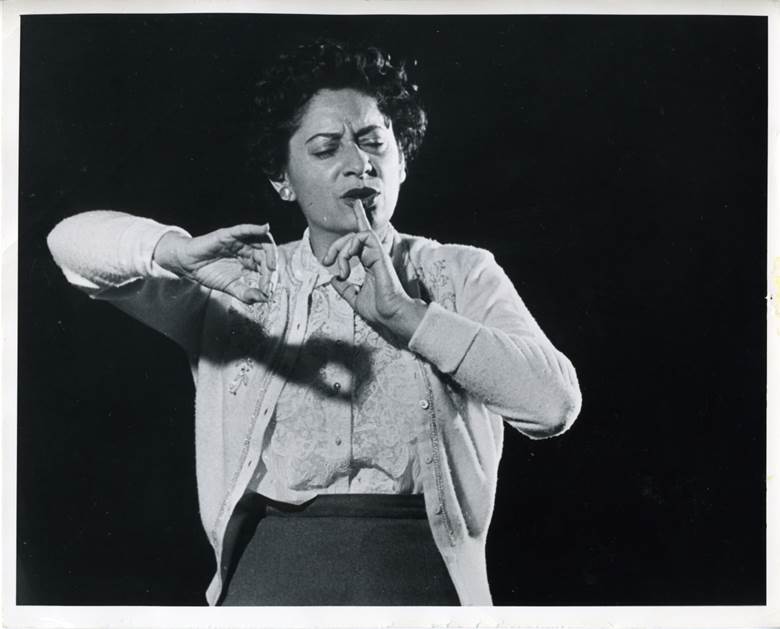 Ethel Stark conducting the Montreal Women's Symphony Orchestra.Photo Credit : Jewish Public Library - Archives
Ethel Stark conducting the Montreal Women's Symphony Orchestra.Photo Credit : Jewish Public Library - Archives
Ethel Stark
Montrealer Ethel Stark was a world-renowned violinist, conductor and teacher.
In 1934, Stark became the first Canadian woman to perform as a soloist in a broadcasted program across the US. In 1940, she founded the Montreal Women’s Symphony Orchestra, which she conducted until the late 1960s. She was also the Founding Director of the New York Women’s Chamber Orchestra, the Ethel Stark Symphonietta and the Montreal Women’s Symphony Strings. Stark was the guest conductor with symphonies in Canada and abroad including Israel and Tokyo, Japan.
Stark is a laureate of the Quebec Academy of Music, recipient of the Curtis diploma, fellow of the Royal Society of Arts, and the recipient of an honorary degree (LLD) from Concordia University. In 2003, she was made a Grand Officer of the National Order of Quebec. She was made a Member of the Order of Canada in 1980.
In 2016, Montreal’s mayor, Denis Coderre, announced that the Claude-Jutras park would be renamed in Ethel Stark’s honour.
Learn more:

-
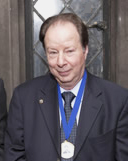 Sidney Altman.Photo Credit : Materialscientist
Sidney Altman.Photo Credit : Materialscientist -

-
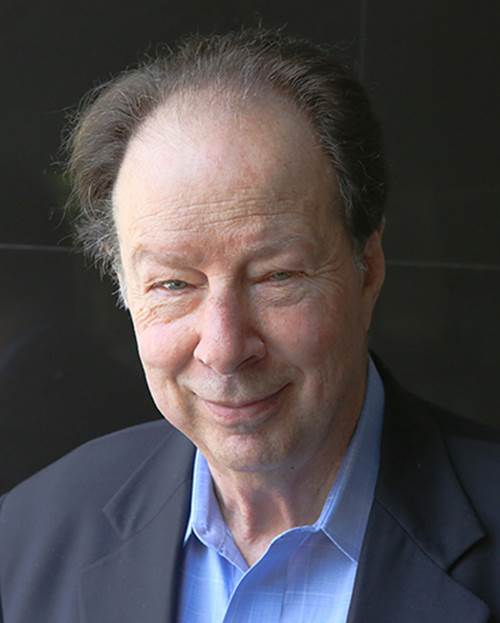 Sidney Altman.Photo Credit : Yale University
Sidney Altman.Photo Credit : Yale University
Sidney Altman
Sidney Altman is a Montreal-born molecular biologist who won the 1989 Nobel Prize for his discovery of catalytic RNA (with co-recipient Thomas Cech).
Born and raised in NDG, Altman was the second-born son of hardworking immigrant parents from Eastern Europe, who placed a strong emphasis on education. His mother worked in a textile mill and his father worked in a grocery store. Altman’s interest in nuclear physics was inspired by the atom bomb, Albert Einstein, and his voracious appetite for reading as a child.
Altman did his undergraduate degree at MIT, receiving his PhD in molecular biology from the University of Colorado. He worked on two research fellowships, one at Harvard and a second one at Cambridge, with Francis Crick, the co-discoverer of DNA’s molecular structure. It was at Cambridge that he began the experiments that would eventually lead to his breakthrough discovery that RNA itself had catalytic properties, just a few weeks before his fellowship ended.
Returning to North America, Altman was hired by Yale University, where he has remained ever since. He is currently the Sterling Professor of Molecular, Cellular, and Developmental Biology and Chemistry. He is married to Ann M. Körner and they have two children.
Learn more:
Les Prix Nobel. The Nobel Prizes 1989, Editor Tore Frängsmyr, [Nobel Foundation], Stockholm, 1990
https://www.nobelprize.org/nobel_prizes/chemistry/laureates/1989/altman-bio.html

-
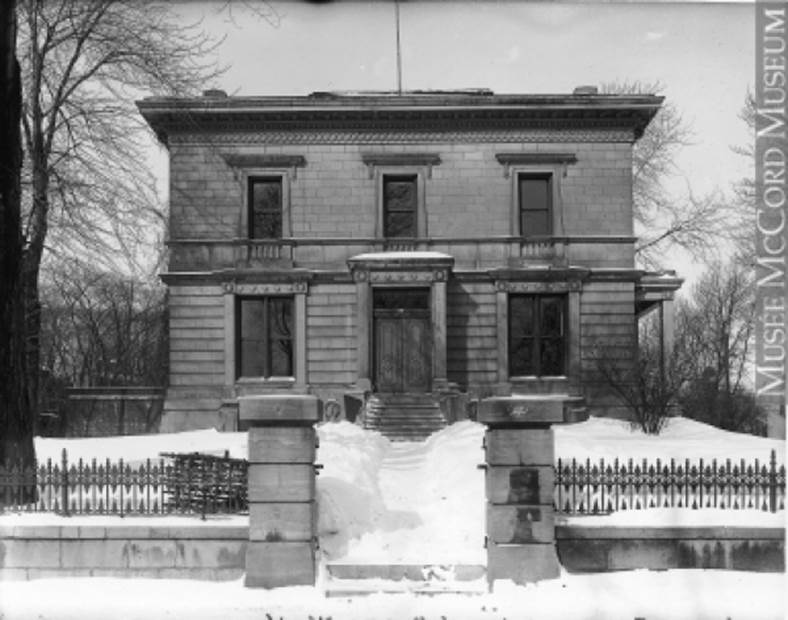 "The Dilcoosha," home to Jesse Joseph. McGill University, Montreal, QC, 1913. Wm. Notman & Son. 1913, 20th century. VIEW-12878.Photo Credit : © McCord Museum, Montréal
"The Dilcoosha," home to Jesse Joseph. McGill University, Montreal, QC, 1913. Wm. Notman & Son. 1913, 20th century. VIEW-12878.Photo Credit : © McCord Museum, Montréal -
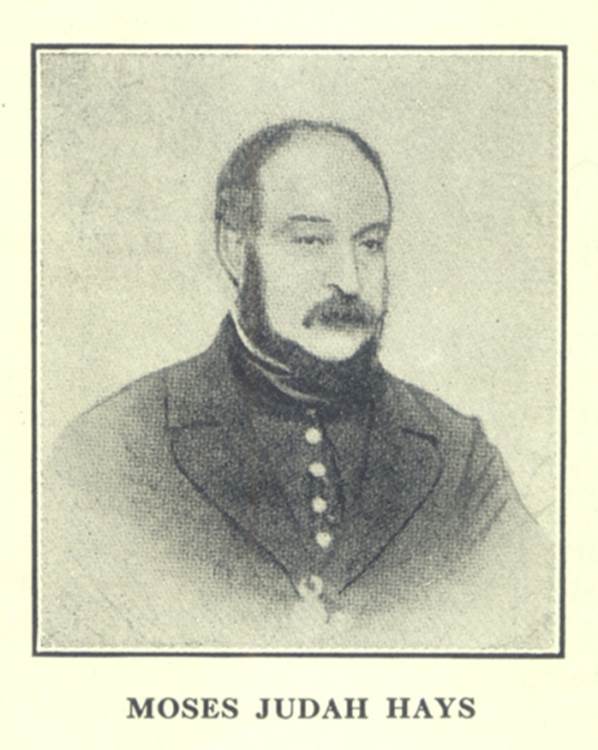 Portrait of Moses Judah Hayes (1926) from the text A Jew in Canada.Photo Credit : Alex Dworkin Canadian Jewish Archives
Portrait of Moses Judah Hayes (1926) from the text A Jew in Canada.Photo Credit : Alex Dworkin Canadian Jewish Archives -
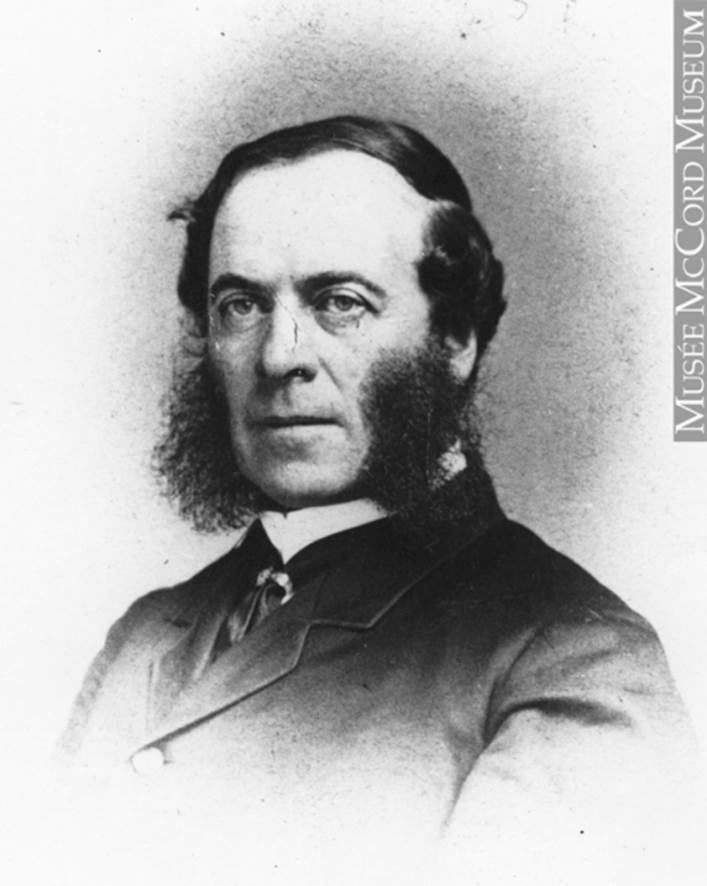 Jesse Joseph, New York, New York, about 1865. Charles D. Fredricks & Co. about 1865, 19th century. MP-0000.2791 © McCord MuseumPhoto Credit : © McCord Museum, Montréal
Jesse Joseph, New York, New York, about 1865. Charles D. Fredricks & Co. about 1865, 19th century. MP-0000.2791 © McCord MuseumPhoto Credit : © McCord Museum, Montréal
19th Century Public Figures
During the 19th century, Moses Hayes was a prominent businessman, a leader in Montreal’s Jewish community and one of the first Jews to enter into public service in the city.
Moses Judah Hayes (1799 – 1861)
Born in Montreal to a prominent Jewish family, Hayes would go on to serve as Director of the Montreal Gas Company and the Provident and Savings Bank. In the mid-1840s, he built Hayes House, a four-storey building with a theatre and Canada’s first shopping centre. It would serve as the seat of Canadian Parliament after the Parliament buildings were torched in 1849. Although not all his business ventures were successful, Hayes retained the respect and admiration of his community.
Hayes was also active in the larger society and was a member of the Montreal Mechanic’s Institute, the Montreal Agricultural Society and the Masons. In honour of his devotion to Montreal, he was among the first two Jews in Canada to be named as Justices of the Peace. In 1845, Hayes was named Police Chief, a post he held until his death 16 years later.
The Joseph Family: Jacob Henry Joseph (1814 – 1907), Jesse Joseph (1817–1904) & Abraham Joseph (1815–1886)
All three were sons of Henry Joseph (1775 – 1832), who was himself the nephew of Aaron Hart, the first Jew in Canada. Joseph settled in Berthier in 1790, eventually relocating to Quebec City. He made his fortune in fur-trading, at one point employing John Jacob Astor. In 1817, he became one of the three Jewish founders of Canada’s first bank, the Bank of Montreal. Three of his sons were also prominent businessmen and philanthropists in Montreal:
Jesse Joseph was a Montreal-based businessman and communal leader. Born in Berthier, Jesse served as President of Montreal Gas Company, having sold his shares in the Montreal Electric Company, claiming it had no future. Establishing mercantile trade between Canada and Belgium, he was named Belgian consul in Montreal. His home, the site of lavish parties, is now the McCord Museum.
Another of Henry Joseph’s sons, Jacob, also made his mark on Montreal. With his brother, he founded the Saint Lawrence and Champlain Railway. Jacob also founded Canada’s first telegraph company. He was a partner in the Newfoundland Telegraph Company, President of the Montreal Elevating Company and Vice President of the Montreal Board of Trade. He is also remembered for his philanthropy and support of cultural organizations in Quebec.
Also born in Berthier, Abraham Joseph moved to Quebec City, where he resided until his death. Aside from taking over for his father upon the latter’s death, Abraham also served as President of the Quebec and Dominion Boards of Trade, as a Director of the Banque Nationale, and as a member of the Quebec City Council (he failed in a bid for the mayoralty). He was a Grand Master of the Grand Masonic Lodge of Quebec and Vice Consul of Belgium in Quebec City.
Learn more:
http://www.biographi.ca/en/bio/hayes_moses_judah_9E.html
B.G. Sack, History of the Jews in Canada: Volume I. (Montreal, 1945)
Arthur Hart, The Jew in Canada.
https://www.jewishvirtuallibrary.org/jsource/judaica/ejud_0002_0011_0_10275.html

-
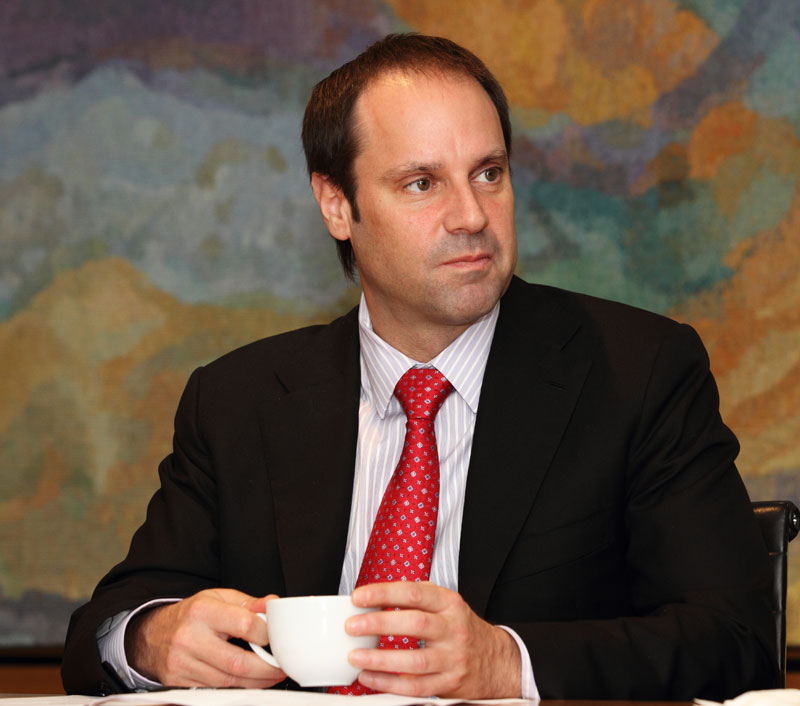 Jeffrey Skoll.Photo Credit : Skoll Foundation
Jeffrey Skoll.Photo Credit : Skoll Foundation
Jeffrey Skoll
Born in Montreal, Jeffrey Skoll is a US-based Dot Com Mogul, film producer, philanthropist and social activist.
Skoll worked his way through an undergraduate degree at University of Toronto by pumping gas. After an MBA at Stanford, he became the President and first full-time employee at eBay, and when the company went public in 1998, Skoll found himself a billionaire.
In 2001, he used these profits to establish the Skoll Foundation, which supports healthcare, employment, climate change, renewable energy and education around the world through more than 70 international NGOs. He is one of only 20 people to have given away more than one billion dollars to charities, including irrigation systems for farms in Africa and centres for at-risk youth. As the only Canadian signatory to Bill Gates and Warren Buffet’s Giving Pledge, for which he was recently made an Officer of the Order of Canada for his “commitment to social causes and innovative practice of philanthropy,” he has already donated over half his fortune to worthy causes, and promises to give away as much as 95%.
Skoll’s commitment to social justice is also exhibited through his award-winning production company, Participant Media, which has produced dozens of films, including He Named Me Malala, Food Inc., Fast Food Nation, Citizen Four and An Inconvenient Truth. Participant Media has recently partnered with Cineflix Media of Montreal to create socially-relevant programming. He also created and supports the Oxford University’s Skoll Centre for Social Entrepreneurship as an international think tank.
Skoll’s efforts to promote peace and prosperity around the world have been honored with the Jefferson Award’s S. Roger Horchow Award for Greatest Public Service by a Private Citizen (2015), a career tribute at the Gotham Independent Film Awards (2012) and the John W. Gardner Leadership Award (2012).
Learn more:
http://www.forbes.com/profile/jeffrey-skoll/
http://www.theglobeandmail.com/news/national/meet-the-canadian-billionaire-whos-giving-it-all-away/article4209888/
https://www.youtube.com/watch?v=-3EP_NFE10s
https://www.youtube.com/watch?v=VXwBfZrv_po
http://www.ted.com/talks/jeff_skoll_makes_movies_that_make_change
http://mrfcj.org/about/iac/jeff-skoll.html

-
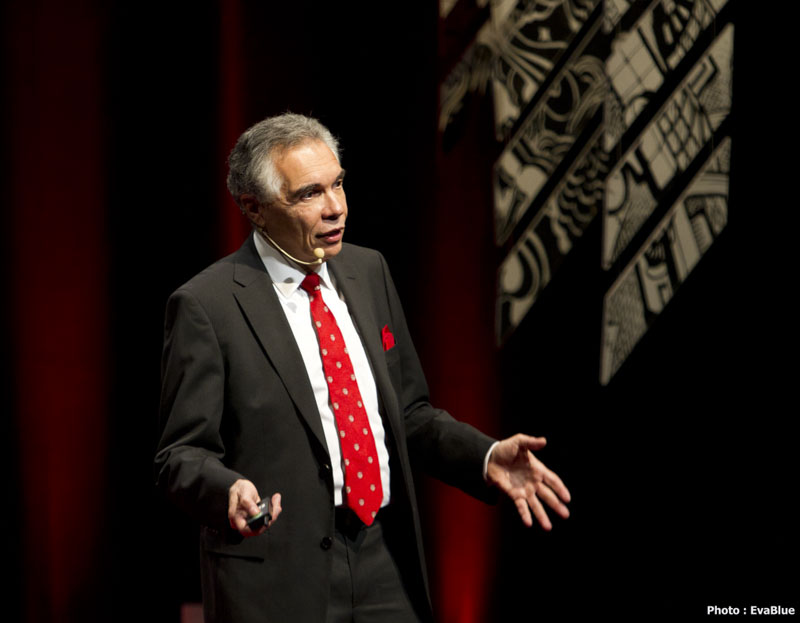 Dr. Joe Schwarcz at TEDx Montreal, 2012.Photo Credit : EvaBlue
Dr. Joe Schwarcz at TEDx Montreal, 2012.Photo Credit : EvaBlue -
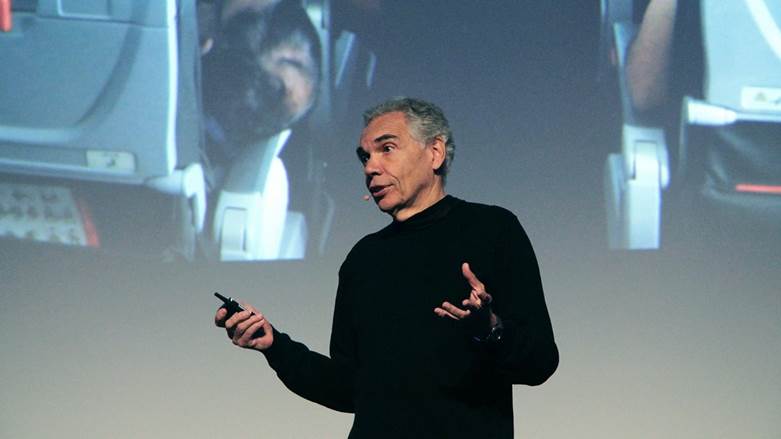 Dr. Joe Schwarcz at the Cusp Conference in 2016.Photo Credit : Cusp Conference
Dr. Joe Schwarcz at the Cusp Conference in 2016.Photo Credit : Cusp Conference -
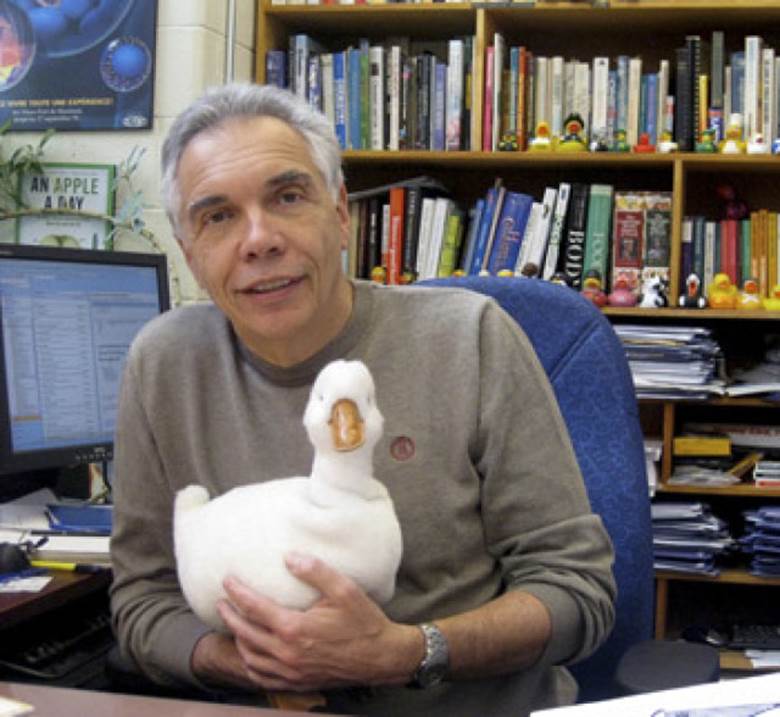 Dr. Joe Schwarcz in his office, 2014.Photo Credit : Canadian Jewish News
Dr. Joe Schwarcz in his office, 2014.Photo Credit : Canadian Jewish News -
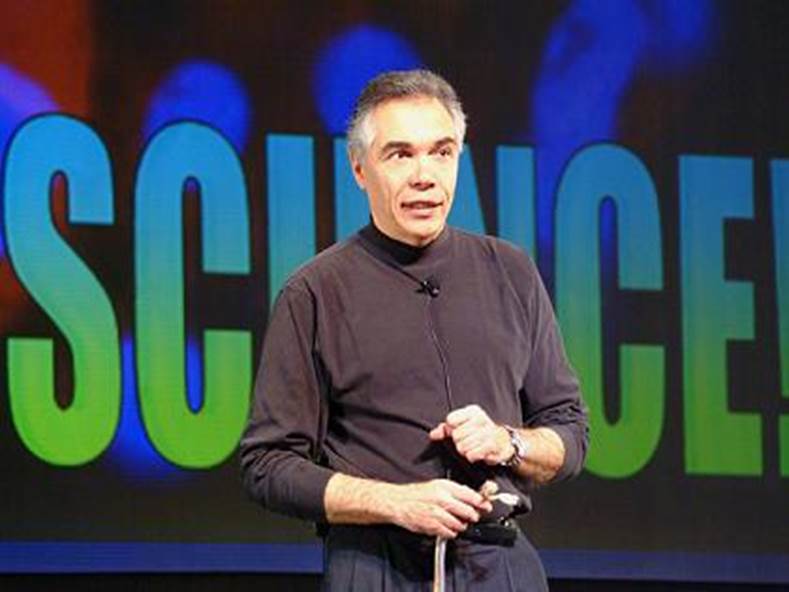 Dr. Joe Schwarcz giving a presentation for the Trafalgar School for Girls.Photo Credit : Image open to public access
Dr. Joe Schwarcz giving a presentation for the Trafalgar School for Girls.Photo Credit : Image open to public access -
 Dr. Joe Schwarcz.Photo Credit : McGill Office for Science and Society
Dr. Joe Schwarcz.Photo Credit : McGill Office for Science and Society -
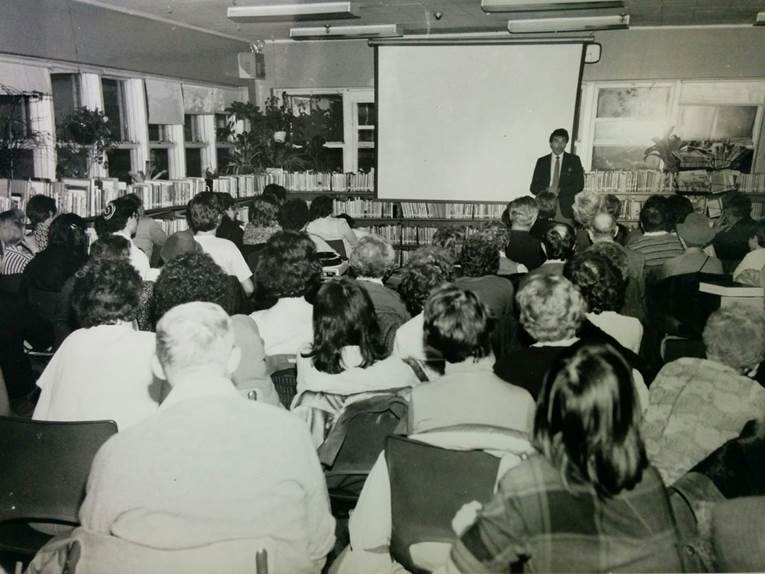 Dr. Joe speaking at the Library of Cote-Saint-Luc.Photo Credit : Cote-Saint-Luc Library
Dr. Joe speaking at the Library of Cote-Saint-Luc.Photo Credit : Cote-Saint-Luc Library
Dr. Joe Schwarcz
Dr. Joseph A. Schwarcz is the current and founding director of the McGill Centre for Science and Society, and a well-known debunker of bad science.
Born in Sopron, Hungary, Dr. Joe, as he is affectionately known, was fascinated by magic as a child, and saw its potential early on to both deceive and to teach. He received his PhD in Chemistry from McGill, where he still works. Dedicated to debunking popular, and often costly, chemical and medical fallacies, Schwarcz has become known as the leading quackbuster.
In 2011, the McGill Office for Science and Society received a $5.5 million grant from Lorne Trottier to continue Schwarcz’s debunking work, considered one of the largest single donations to a scientific cause in Canada. Trottier refers to Schwarcz as the “Carl Sagan of Canada.”
Schwarcz currently serves as Co-Chair of the Inflammatory Bowel Disease Nutrition Forum and Chair of the Editorial Board of Canadian Chemical News. He has published over a dozen books, writes a weekly newspaper column, hosts a radio show and frequently holds public consultations and lectures. He has attacked the purported medical value of acai berries, coffee enemas as cancer cures, detoxification and beauty products. He even attacked McDonald’s nutritional claims.
Among his awards are the Royal Society of Canada’s McNeil Award and the American Chemical Society’s prestigious Grady Stack Award, the Royal Canadian Institute’s Sanford Fleming Medal, the Society of Chemical Industry’s Purvis Award and the Chemical Institute of Canada’s Montreal Medal. He is also involved with the American Chemical Society, the Institute of Food Technologies, and the JGH Cancer Prevention Centre.
Learn more:
http://www.macleans.ca/society/health/who-you-gonna-call/
http://www.cbu.ca/alumni/honorary-degree-recipients/joseph-a-schwarcz/
http://www.cjnews.com/living-jewish/jewish-learning/joe-schwarcz-making-science-palatable-without-trivializing
https://vimeo.com/155613132

-
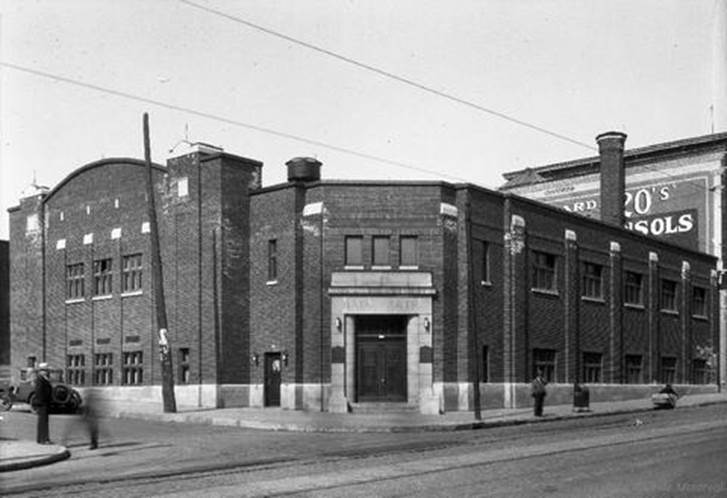 The Schubert Bath (Schubert Pool today - 3950 St. Laurent), built in 1932.Photo Credit : Archives of the City of Montreal
The Schubert Bath (Schubert Pool today - 3950 St. Laurent), built in 1932.Photo Credit : Archives of the City of Montreal -
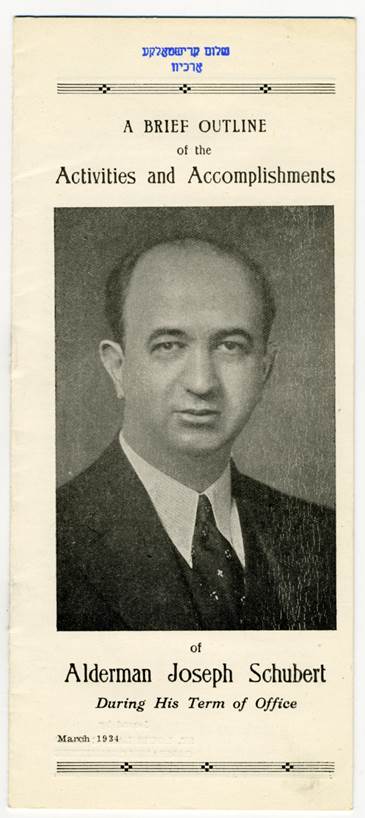 Joseph Schubert election flyer, ca. 1934.Photo Credit : Jewish Public Library - Archives
Joseph Schubert election flyer, ca. 1934.Photo Credit : Jewish Public Library - Archives -
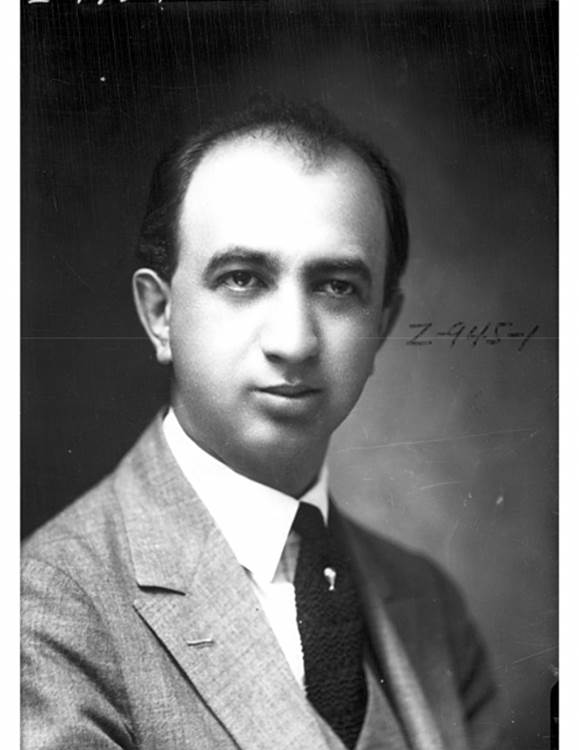 Portrait, Joseph Schubert, 1928.Photo Credit : City of Montreal Archives
Portrait, Joseph Schubert, 1928.Photo Credit : City of Montreal Archives -
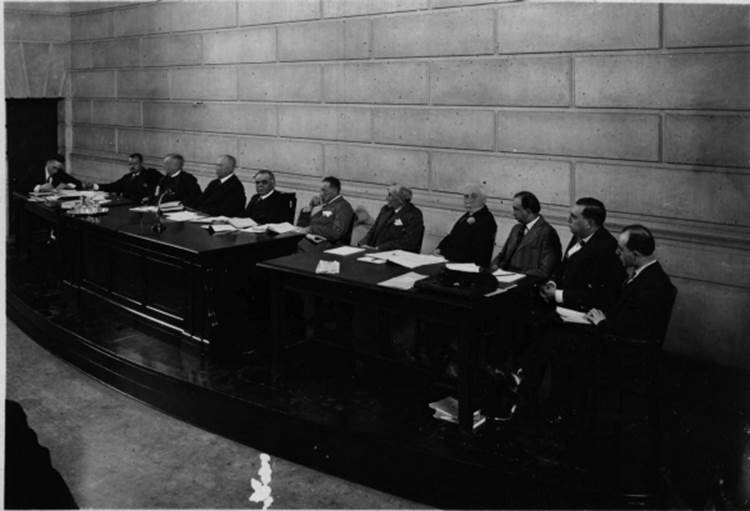 Joseph Schubert (third from right) and the Gouin School Commission in 1924.Photo Credit : Alex Dworkin Canadian Jewish Archives
Joseph Schubert (third from right) and the Gouin School Commission in 1924.Photo Credit : Alex Dworkin Canadian Jewish Archives -
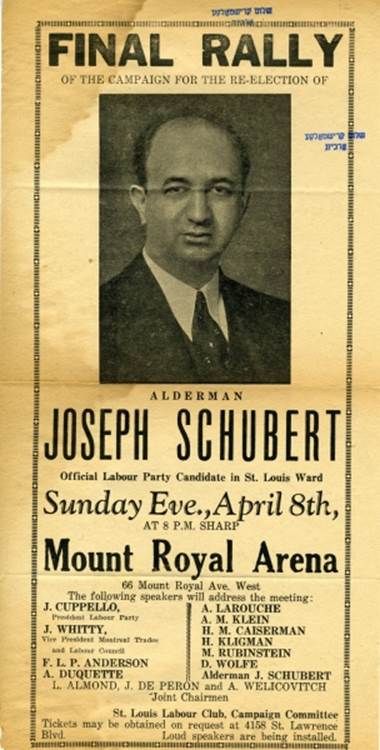 Joseph Schubert election flyer, ca. 1934.Photo Credit : Jewish Public Library - Archives
Joseph Schubert election flyer, ca. 1934.Photo Credit : Jewish Public Library - Archives
Joseph Schubert
Joseph Schubert was a popular labour organizer, public health advocate and City Council alderman in the 1920s and 30s, who represented the interests of Montreal’s “downtowner” immigrant Jewish community during its formative years.
After arriving from Romania, Schubert worked as a pants maker before quickly rising to prominent positions in labour, the Jewish community and civic administration. A defender of workers’ rights, he condemned exploitation in clothing factories and later became secretary of the Cloak Pressers’ Union. Needle trade unions were often Jewish organizations, initiated by Eastern European immigrants who arrived with ideas inspired by the socialist ideas of the Bund (the East European General Union of Jewish Workers), as well as the Workmen’s Circle (founded by East European Jews in the United States).
Various disputes, including the 1912 strike against the Clothing Manufacturers’ Association of Montreal, pitted “uptowner” Jewish factory owners against “downtowner” Jewish immigrants. A passionate speaker and effective organizer, Schubert helped negotiate a compromise of a 49-hour, rather than 55-hour, work week.
Up until 2012, Schubert was Montreal’s highest-ranking Jewish official in the history of its municipal government. Elected to Montreal’s City Council in 1924 to represent the predominantly Jewish St. Louis ward, he advocated for workers’ rights during his 15 years in office. One success was the attainment of an eight-hour day and a $0.50 hourly minimum wage for municipal employees. During a 1925 strike, Schubert disputed rumours that the strikers were all Jewish, as pervasive anti-Semitism discredited the workers’ efforts.
A socialist, Schubert promoted the unpopular stance of higher taxes to improve social services. He battled rumours of communist affiliations stemming from his sympathy for allegedly communist Russian Jews barred from immigration and from his position as Montreal’s only Labour Party alderman. Despite such accusations, Schubert retained popular support, leading the opposition to the powerful Liberal administration from 1924-30 and criticizing their dealings with the underworld.
Schubert’s advice was sought during the 20s “Jewish School Question.” He was appointed by Premier Louis-Alexandre Taschereau as one of three Jewish representatives to sit with Protestant and Catholic leaders on a Royal Commission called the “Committee of Nine.” Schubert voted for a separate Jewish school system.
As alderman, Schubert addressed the spread of diseases due to overcrowding and unsanitary working conditions. During the Depression, he was commissioned to write a report on unemployment and relief distribution across North America. His recommendations struck a chord, as public spending on Montreal’s public health was the lowest proportionally in North America, an embarrassment given that the city had the highest infant death rate on the continent, and the largest number of tuberculosis patients. The report resulted in a Public Health Commission, in which Schubert was active in creating measures to prevent the spread of disease. In a 1931 public health initiative, Schubert built the Schubert Baths (Bains Schubert), a public bathhouse for immigrant families lacking access to hot water, which today is a public pool on the corner of Bagg and St. Lawrence.
Special thanks to the Museum of Jewish Montreal.
Learn more:
http://imjm.ca/location/1020
http://www.cjhn.ca/permalink/38718
http://www.imtl.org/montreal/building/Bains-Schubert.php

